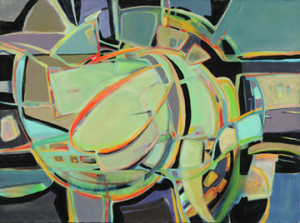Lisa Jeffries: Your poem “Umbrella Mouth Gulper Eel” deals with some heavy topics: heroin addiction, isolation, death. What was the inspiration?
Jamie McGraw: A little less than two years ago, I developed a nasty pill and intravenous drug habit. I nearly died, spent a week in a mental hospital. I hid my addiction fairly well. I mean, my arms and legs were always covered with bruises, my hands and feet were constantly swollen, and I looked like total shit—but I didn’t get many questions. If I did, it was usually, “Is someone hurting you?” Nobody thought I was the sort of person who’d fall into that hole. Probably a reason I fell so hard.
Writing about that period is difficult, for sure, but also cathartic. “Umbrella Mouth Gulper Eel” was the first poem I wrote after my hospital stay. It was originally two pages long, a complete mess. Allowing people, grad school peers and a few friends, to read it was horrifying. And one of my biggest breakthroughs, in terms of both my writing and my recovery. Disclosing your screw-ups, even in the form of a fantastical poem, is a big, scary thing. But if I never let it loose, all of my poems would be very Taylor Swift. Meaning I would be rich.
LJ: What about the idea of deep-sea creatures?
JM: I was looking at a list online, Top Ten Weirdest Sea Creatures, or something similar. I thought, hey, that’s me. An ugly fish at the bottom of sea. But look, I’ve got a little light. Got to see somehow.
LJ: I’ve read some of your other work, and you tend to tackle difficult topics head-on and rather grotesquely. Does this ever feel risky to you?
JM: Always. This January I attended a seminar taught by Pinckney Benedict, who is so, so amazing, a wonderful fiction writer and teacher. At the beginning of class, he told us to write a letter to a person, living and whom we knew, confessing something that would wholly alter that person’s view of us, completely change the relationship. I wrote to my dad. Then he told us to fold the letter, and, to the best of our knowledge, write the person’s address, and pass the letters to the front of the class. Horrifying, right? What is going to happen to these gut-splattered things, everyone’s thinking.
He said, that feeling you just experienced, that feeling of absolute dread and terror, that’s how you should feel each and every time you let someone read your work. Don’t write stories or poetry or lyrics that make you seem dateable; you’re probably already un-dateable, you know? Your work should make readers assume you’re the kind of guy who wears trench coats and gawks at children playing in the park. Risks are important. Healthy, non-criminal risks, of course.
LJ: I’m always interested in asking other writers this: what is your writing process?
JM: Ideas come to me sporadically. If I’m out, I try to scrawl down a few key words on a napkin or my hand, or e-mail them to myself. Eavesdropping is a terrific method of coming up with stuff. People are always saying the greatest first lines, particularly kids.
I usually focus on one abiding image, the tinier and stranger the better. I like to vomit up every unconscious thought about that image—the look, smell, taste, feel, everything—using pen and paper. I’ve found that if I start writing a piece on the computer, it becomes stiff. The words too detached from the heart of the poem.

LJ: Your bio says to ask you about your spirit animal. A lobster?
JM: When I was a kid, if I were ever somewhere with a lobster tank—Red Lobster, the grocery store—I would press my face against the glass and stare at them, until my mom
dragged me away and told me I was weird. I think they’re beautiful creatures. I would
never eat one. It would haunt me forever.
I also have a giant lobster tattoo on my left arm. Girl with the lobster tattoo. The spirit
animal line is mostly a joke in response to “Why do you have a lobster on your arm?” Or
I tell an elaborate story about how my grandmother was drowning off the shore of Maine
and was saved by a family of lobsters.
LJ: What does recovery mean to you?
JM: I’m unsure that I’m in recovery just yet. I’m always recovering. Not only from drug addiction, but from the overwhelming disappointment and sadness that I allowed myself to fall prey to it. I suppose recovery is finally letting out that hulking sigh that’s been festering and rotting and molding in the deepest part of your lungs. It’s about feeling lighter.
Lisa Jeffries is a middle school teacher in the Durham, North Carolina area. In her (very little) spare time, she writes poetry. Her work has been featured in The Dead Mule School of Southern Literature and Main Street Rag.


Pingback: Umbrella Mouth Gulper Eel | Rkvry Quarterly Literary Journal
Pingback: “Umbrella Mouth Gulper Eel” by Jamie McGraw | Rkvry Quarterly Literary Journal